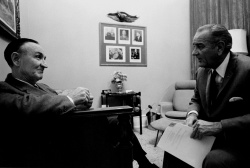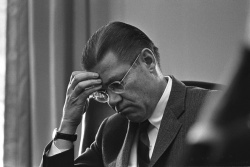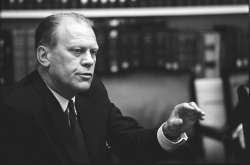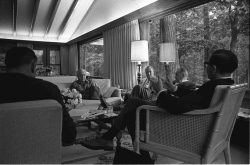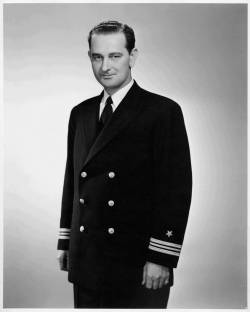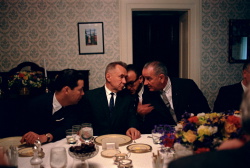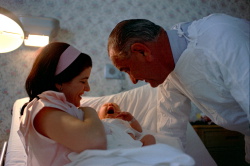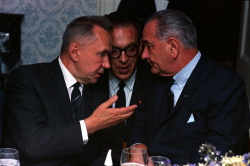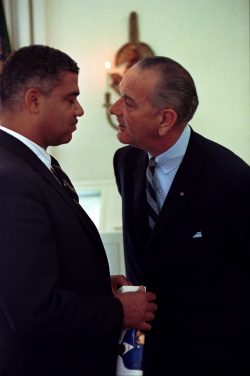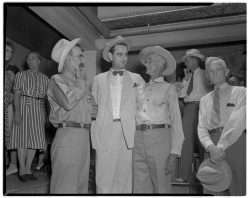1st2nd3rd4th5th6th7th8th9th10th11th12th13th14th15th16th17th18th19th20th21st22nd23rd24th25th26th27th28th29th30th
June 1st
On this day in 1967, President Johnson met with Prime Minister Harold Holt of Australia in the Oval Office of the White House regarding Vietnam.
On this day in 1964, President Johnson met with Prime Minister Levi Eshkol of Israel at the White House.
June 2nd
On this day in 1966, President Johnson had a telephone conversation with Senator Richard Russell. There are two parts of the conversation.
In the first, the men discussed the creation of a Senate Central Intelligence Agency watchdog subcommittee of the Foreign Relations Committee; the Georgia Governor’s race; an unfavorable poll on Vietnam; the election in the Dominican Republic; Cuba and the USSR; the composition of U.S. forces in Vietnam; and use of the reserves.
In the second part of the conversation, the two men talked about the appropriation bills; Russell suggested that LBJ impound funds. The men discussed school aid; the school lunch program; Rural Electrification Authority; inflation; the mid-term elections; the drop in LBJ’s approval rating; and Job Corps.
On this day in 1965, President Johnson presented the President’s Award for Distinguished Federal Civilian Service.
The recipients of the awards and the highlights of their citations as released by the White House were:
- Howard C. Grieves, Assistant Director of the Bureau of the Census, who “has contributed impressively to the effective functioning of the National economy by vastly improving the timeliness and reliability of the statistical products of our census system.”
- Homer E. Newell, Associate Administrator for Space Science and Applications, National Aeronautics and Space Administration, who “has been significantly responsible for this Nation’s success in the unmanned satellite and space probe projects.”
- Frank B. Rowlett, Special Assistant to the Director, National Security Agency, Department of Defense, who “by his inventive genius and managerial skill has contributed profoundly to the security of the Nation.”
- Clyde A. Tolson, Associate Director of the Federal Bureau of Investigation, Department of Justice, who “has been a vital force in raising the proficiency of law enforcement at all levels and in guiding the Federal Bureau of Investigation to new heights of accomplishment through periods of great National challenge.”
- Philip H. Trezise, Deputy Assistant Secretary for Economic Affairs, Department of State, who “has developed imaginative solutions to vital and complex economic problems arising in United States relations with foreign countries.”
June 3rd
On this day in 1961, Vice President Johnson had surgery on his hands at Bethesda Naval Hospital.
On this day in 1964, President Johnson made remarks to members of the delegation to the D-Day Ceremonies.
“Your country remembers and will never forget, the resolve born on that D-Day, that, so long as we are able, and other men are willing to stand together, we shall not permit the light of freedom to be extinguished on any continent again.”
On May 23 the President announced that, in response to an invitation to the United States Government from the Government of France, he had appointed an official delegation to attend the ceremonies which would be held in France June 5, 6, and 7 commemorating the D-Day landings in Normandy 20 years prior. Also announced were the names of the 22 members of the delegation, headed by General of the Army Omar N. Bradley who served as personal representative of the President.
June 4th
On this day in 1965, President Johnson described the role of African Americans in America in an address entitled To Fulfill These Rights at Howard University, Washington, D.C.
“We seek not just freedom but opportunity. We seek not just legal equity but human ability, not just equality as a right and a theory but equality as a fact and a result.”
On this day in 1968, President Johnson met with President Jose Joaquin Trejos Fernandez of Costa Rica at the White House.
On this day in 1965, President Johnson met with Chancellor Ludwig Erhard of Germany at the White House.
On this day in 1964, President Johnson had a telephone conversation with Walter Reuther, head of the United Automobile Workers. The two men discussed the liberal-conservative split in Texas.
June 5th
On this day in 1964, President Johnson met with the Mohammad Reza Shah Pahlavi of Iran at the White House.
On this day in 1967, the Six-Day War began in the Middle East between Israel and its Arab neighbors Egypt, Jordan and Syria. The “Hot Line” was used for the first time for communication between President Johnson and Soviet Premier Alexsei Kosygin and was the topic of discussion in a telephone conversation between President Johnson and Defense Secretary Robert McNamara.
McNamara told the President that the Moscow Hot Line was operating and Soviet Premier Alexsei Kosygin was asking if LBJ was near the Hot Line machine; arrangements had been made for LBJ to receive a message; McNamara read a Soviet message about the Middle East crisis and LBJ asked McNamara’s advice about the response.
On this day in 1968, President Johnson addressed the Nation Following the Attack on Senator Robert F. Kennedy.
“I speak to you this evening not only as your President, but as a fellow American who is shocked and dismayed, as you are, by the attempt on Senator Kennedy’s life, deeply disturbed, as I know you are, by lawlessness and violence in our country, of which this tragedy is the latest spectacular example.
“We do not know the reasons that inspired the attack on Senator Kennedy. We know only that a brilliant career of public service has been brutally interrupted; that a young leader of uncommon energy and dedication, who has served his country tirelessly and well, and whose voice and example have touched millions throughout the entire world, has been senselessly and horribly stricken.
“At this moment, the outcome is still in the balance. We pray to God that He will spare Robert Kennedy and will restore him to full health and vigor. We pray this for the Nation’s sake, for the sake of his wife and his children, his father and his mother, and in memory of his brother, our beloved late President.
“The Kennedy family has endured sorrow enough, and we pray that this family may be spared more anguish.
“Tonight this Nation faces once again the consequences of lawlessness, hatred, and unreason in its midst. It would be wrong, it would be self-deceptive, to ignore the connection between that lawlessness and hatred and this act of violence. It would be just as wrong, and just as self-deceptive, to conclude from this act that our country itself is sick, that it has lost its balance, that it has lost its sense of direction, even its common decency.
“Two hundred million Americans did not strike down Robert Kennedy last night any more than they struck down President John F. Kennedy in 1963 or Dr. Martin Luther King in April of this year.
“But those awful events give us ample warning that in a climate of extremism, of disrespect for law, of contempt for the rights of others, violence may bring down the very best among us. A Nation that tolerates violence in any form cannot expect to be able to confine it to just minor outbursts.
“My fellow citizens, we cannot, we just must not, tolerate the sway of violent men among us. We must not permit men who are filled with hatred, and careless of innocent lives, to dominate our streets and fill our homes with fear.
“We cannot sanction the appeal to violence, no matter what its cause, no matter what the grievance from which it springs.
“There is never—and I say never—any justification for the violence that tears at the fabric of our national life; that inspires such fear in peaceful citizens that they arm themselves with deadly weapons; that sets citizen against citizen or group against group.
“A great nation can guarantee freedom for its people and the hope of progressive change only under the rule of law. So let us, for God’s sake, resolve to live under the law.
“Let us put an end to violence and to the preaching of violence.
“Let the Congress pass laws to bring the insane traffic in guns to a halt, as I have appealed to them time and time again to do. That will not, in itself, end the violence, but reason and experience tell us that it will slow it down; that it will spare many innocent lives.
“Let us purge the hostility from our hearts and let us practice moderation with our tongues.
“Let us begin in the aftermath of this great tragedy to find a way to reverence life, to protect it, to extend its promise to all of our people.
“This Nation and its people have suffered grievously from violence and assassination. For this reason, I am appointing, with the recommendation of the leadership of the Congress—with whom I have talked this evening—a commission of most distinguished Americans to immediately examine this tragic phenomenon. They are: Dr. Milton Eisenhower, the former distinguished President of Johns Hopkins University, Archbishop Terence Cooke of New York, Albert E. Jenner, Jr., of Illinois, Ambassador Patricia Harris, Mr. Eric Hoffer, Senator Philip A. Hart, Senator Roman Hruska, Congressman Hale Boggs, Congressman William McCulloch, and Judge Leon Higginbotham.
“The commission will look into the causes, the occurrence, and the control of physical violence across this Nation, from assassination that is motivated by prejudice and by ideology, and by politics and by insanity, to violence in our cities’ streets and even in our homes.
“What in the nature of our people and the environment of our society makes possible such murder and such violence?
“How does it happen? What can be done to prevent assassination? What can be done to further protect public figures? What can be done to eliminate the basic causes of these aberrations?
“Supported by the suggestions and recommendations of criminologists, sociologists, and psychologists, all of our Nation's medical and social sciences, we hope to learn why we inflict such suffering on ourselves. I hope and pray that we can learn how to stop it.
“This is a sober time for our great democracy, but we are a strong and we are a resilient people who can, I hope, learn from our misfortunes, who can heal our wounds, who can build and find progress in public order.
“We can. We must.
“So I appeal to every American citizen tonight: Let us begin tonight.”
June 6th
On this day in 1964, President Johnson made remarks and unveiled a Plaque in Honor of the 50th Anniversary of the ILGWU (International Ladies Garment Workers Union) Health Center.
On this day in 1968, President Johnson made a statement on the death of Senator Robert F. Kennedy.
“This is a time of tragedy and loss. Senator Robert Kennedy is dead.
“Robert Kennedy affirmed this country-affirmed the essential decency of its people, their longing for peace, their desire to improve conditions of life for all.
“During his life, he knew far more than his share of personal tragedy.
“Yet he never abandoned his faith in America. He never lost his confidence in the spiritual strength of ordinary men and women. He believed in the capacity of the young for excellence—and in the right of the old and poor to a life of dignity.
“Our public life is diminished by his loss.
“Mrs. Johnson and I extend our deepest sympathy to Mrs. Kennedy and his family. I have issued a proclamation calling upon our Nation to observe a day of mourning for Robert Kennedy.”
On this day in 1968, President Johnson sent a Letter to the President of the Senate and the Speaker of the House Urging Passage of an Effective Gun Control Law.
I call upon the Congress in the name of sanity, in the name of safety—and in the name of an aroused nation—to give America the Gun Control Law it needs.
I urge the Congress to make it unlawful to sell rifles and shotguns—as well as hand guns—by mail order.
I urge the Congress to make it unlawful to sell rifles and shotguns—as well as hand guns—to persons who are too young to bear the terrible responsibility that is placed in the hands of a gun owner.
I urge the Congress to make it unlawful to sell rifles and shotguns—as well as hand guns—in one State to residents of another.
This will not prevent legitimate hunters or sportsmen from purchasing firearms but with this reinforced law we can give the States the proper incentive to shape their own gun control legislation, and the country can at long last have a network of systematic safeguards for all our citizens.
I am asking the Governors of the fifty States immediately and comprehensively to review their gun laws and to amend them where necessary to fully protect citizens of their States from deadly weapons in dangerous hands.
The voices of the few must no longer prevail over the interests of the many.
When I last appealed to the Congress on this subject again only a month ago, I asked this question: ‘What in the name of conscience will it take to pass a truly effective gun control law?’
In this new hour of tragedy, that question should at last be answered. Let us now spell out our grief in constructive action.
June 7th
On this day in 1965, President Johnson met with Prime Minister Robert Gordon Menzies of Australia at the White House.
On this day in 1965, President Johnson had a telephone conversation with astronauts James McDivitt and Edward White after the successful completion of the Gemini 4 flight. The astronauts set a new space endurance record and Major White took a 23-minute walk in space.
THE PRESIDENT “I just wanted to say to you and Major White, ‘Well done.’ We are all in this country very proud of you and, I think, the entire world is grateful for what you have done and, particularly, for your safe return. You have both written your names in history and in our hearts. God bless you both and your very fine families.”
MAJOR MCDIVITT “Mr. President, you certainly make me proud saying something like that. As you know, this is one of the happiest days of my life.”
THE PRESIDENT “Major White, there are several million people in this country that have been wondering for 3 days what you were doing to Jim’s windshield when he called you a dirty dog.”
MAJOR WHITE “Mr. President, this is Major White.”
THE PRESIDENT “Major, there are several million people in this country that have been wondering for 3 days what you were doing to Jim’s windshield when he called you a dirty dog.”
MAJOR WHITE “There wasn't too much I could do. We were pretty close, but there wasn't much I could do about it.”
THE PRESIDENT “Well, we’re mighty glad that you have had a safe return. We’re all very proud of you, and we are looking forward to seeing you. Major McDivitt, you had a little trouble talking Ed back in from his walk the other day, do you think you might be able to persuade him to come to see us this weekend down in Texas if I can get down there?”
MAJOR WHITE “This is Major White on here still, sir. I'll get Major McDivitt on it. But I think that will be very fine. Just a moment.”
MAJOR MCDIVITT “Mr. President, this is Major McDivitt again.”
THE PRESIDENT “I said you had a little trouble talking Ed back in from his walk the other day, do you think you might be able to persuade him to come up to see me this week if I can get down to Texas?”
MAJOR MCDIVITT “Well, I don't think there will be any trouble whatsoever.”
THE PRESIDENT “Well, you talk to your families and we'll see if we can’t get together down at the ranch about Friday or Saturday. I’ve been saving a little something for you.”
MAYOR MCDIVITT “Yes, sir. It would make me the happiest man in the world. I’m sure this will make Ed equally happy.”
THE PRESIDENT “I heard Major White’s wife say she wanted to go to Colorado, but you tell her to just hold off that trip until you get up to the ranch. I’ll have my military aide get in touch with you in a day or two and I hope we can make it probably Saturday morning.”
MAJOR MCDIVITT “Yes, sir, we certainly would love that.”
THE PRESIDENT “Now, I just want to say this finally to the two of you. What you have done will never be forgotten. We can hope and we do pray that the time will come when all men of all nations will join together to explore space together, and walk side by side toward peace. And you two outstanding men have taken a long stride forward in mankind's progress. And everyone in this Nation and, I think, in the free world feels in your debt.”
MAJOR MCDIVITT “Thank you very much, sir, we appreciate that.”
On this day in 1968, President Johnson wrote a memorandum directing the development of contingency plans for oil spill emergencies. This memorandum was for Honorable Clark M. Clifford, Secretary of Defense; Honorable Stewart L. Udall, Secretary of the Interior; Honorable Alan S. Boyd, Secretary of Transportation; and Honorable Donald F. Hornig, Director, Office of Science and Technology.
The Nation’s readiness for responding promptly and effectively to an oil spill along our coasts and waterways is of increasing importance. On the recommendation of the National Council on Marine Resources and Engineering Development, I am asking you to assume special responsibilities in order to strengthen our preparedness to act in the event of such an emergency.
On this day in 1968, President Johnson met with Prime Minister Hugh Shearer of Jamaica at the White House.
June 8th
On this day in 1965, President Johnson had a telephone conversation with Senator Mike Mansfield. The recordings are in two parts.
In the first part of the conversation, LBJ asked Mansfield’s advice on Vietnam. They discussed the history of the U. S. role in Vietnam and General Westmoreland’s request for more troops. The men also talked about congressional doubts about the Vietnam policy, the bombing campaign, and South Vietnamese desertions. They talked about the situation in the Dominican Republic and Senator George Aiken's opposition to Asian economic aid.
In the second part of the conversation, President Johnson and Senator Mansfield discussed Maxwell Taylor's meeting with congressional leaders; press leaks; and Henry Cabot Lodge as U S. Ambassador to Vietnam. In addition, they talked about Senate opposition to a bill allowing William "Bozo" McKee to head the FAA; the foreign aid bill; and the situation in the Dominican Republic.
On this day in 1967, The USS Liberty, a U.S. Navy communications ship, was attacked off the Sinai coast. National Security Adviser Walt Rostow gave President Johnson the first report that the USS Liberty had been attacked in the Mediterranean. The Israeli government informed the U.S. government that they attacked the ship in error.
On this day in 1968, President Johnson met with Prime Minister John M. Lynch of Ireland at the White House.
June 9th
On this day in 1965, President Johnson had a telephone conversation with Undersecretary of State George Ball. Ball told LBJ he would meet with Cyrus Vance and Earle Wheeler to analyze facts about a U.S. airplane that was downed over Hainan Island and would then recommend a response to China. LBJ expressed concern about the effect the incident would have on the Senate vote on the Education Bill.
June 10th
On this day in 1967, Soviet Premier Alexsei Kosygin told President Johnson that the Soviet government was prepared to act independently if Israel did not stop military action against Syria. President Johnson responded to Chairman Alexsei Kosygin’s message which threatened Soviet intervention in the Middle East, saying that the Israelis had agreed to a ceasefire.
On this day in 1965, President Johnson had a telephone conversation with Defense Secretary Robert McNamara. There are two parts to the conversation.
In the first part of the conversation, they talked about the Joint Chiefs of Staff meeting on two plans for more U.S. forces in Vietnam; a possible briefing for former President Eisenhower; the number of troops in each plan; the extension of Maxwell Taylor’s appointment; the views of Senators Mike Mansfield and George Aiken; and the deteriorating Vietnam situation.
In the second part of the conversation, President Johnson and McNamara talked about a possible new congressional resolution on the increase of U.S. forces or a repeal of the Tonkin Gulf resolution; Vietnam policy; and the need to respond to Viet Cong build up.
June 11th
On this day in 1965, President Johnson made remarks in Houston at the NASA Manned Spacecraft Center.
“All people have a new sense of thrill, and excitement, and anticipation about space exploration because of the flight of Gemini 4.
“The joy and the thrill and the exhilaration that Ed White experienced on his walk from the Pacific Ocean to the Atlantic ran through the veins of us all. Our attitudes about space will never entirely be the same again.
“And let me make one other observation. I read with mixed emotions yesterday that Major White had decided to claim this State of his birth as his home State. Well, as President, I am supposed to be neutral on matters of State pride, but the glimmer of pride I allow myself to feel is subdued just a bit. I know some will say that as soon as Americans got themselves up into space a Texan had to go and put his foot in it.
“Seriously, I hope that the clear and obvious meaning and promise of this great adventure, which all of you have really shared, will not be lost upon mankind.”
On this day in 1968, President Johnson issued a statement on the tie vote on a Gun Control Bill in the House Judiciary Committee.
“The deadlock in the House Judiciary Committee, which resulted in the defeat of the strict gun control legislation I recommended yesterday, is a bitter disappointment to all Americans and to the President. There is no excuse whatsoever for failure to act to prohibit the interstate mail-order sale of rifles. Of the 2 million guns added each year to the arsenal already in the hands of millions of Americans, 1 million are sold by mail order houses in interstate commerce, and 30 percent of the murders by firearms committed each year in this country are by rifle and shotgun fire.
“I hope that the House Judiciary Committee will promptly reconsider this shocking blow to the safety of every citizen in this country.”
June 12th
On this day in 1965, President Johnson issued Proclamation 3658: Flag Day, 1965.
NOW, THEREFORE, I, LYNDON B. JOHNSON, President of the United States of America, do hereby direct that the flag of the United States be displayed on all Government buildings on Monday, June 14, 1965, in observance of Flag Day and I call upon all fellow Americans to observe that day with appropriate ceremonies designed to honor our national emblem.
I urge every citizen to pledge once more his allegiance to our flag and to rededicate himself to the principles and ideals for which it is an inspiring tangible symbol. I also urge every American to remember the valiant sacrifices made by our forefathers and patriots through the years-both soldiers and civilians-in the name of our flag in order that our Nation might continue to be “the land of the free and the home of the brave.”
On this day in 1964, the National Symphony Orchestra featuring Maria Tallchief and Jacques D’Amboise performed at a state dinner for West German Chancellor Ludwig Erhard.
June 13th
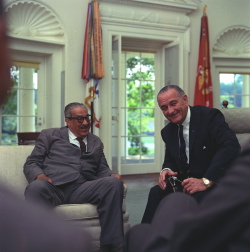 Meeting regarding announcement of Thurgood Marshall's nomination as an Associate Justice of the Supreme Court of the United States
Meeting regarding announcement of Thurgood Marshall's nomination as an Associate Justice of the Supreme Court of the United Statescredit: Frank Wolfe
On this day in 1967, President Johnson nominated Thurgood Marshall as an Associate Justice of the United States Supreme Court—the first African American to hold that office.
In remarks to the news media that day, the President said,
“He has argued 19 cases in the Supreme Court since becoming Solicitor General. Prior to that time, he had argued some 33 cases. The statisticians tell me that probably only one or two other living men have argued as many cases before the Court—and perhaps less than half a dozen in all the history of the Nation. The Solicitor has had some 50-odd cases. He has lost only eight of those cases.
“His background will be given you by George Christian. Mr. Marshall was first in his class at Howard. He has had a distinguished record as private counsel and as Government counsel in the courts of the land. I believe he has already earned his place in history, but I think it will be greatly enhanced by his service on the Court.
“I believe he earned that appointment; he deserves the appointment. He is best qualified by training and by very valuable service to the country. I believe it is the right thing to do, the right time to do it, the right man and the right place.
“I trust that his nomination will be promptly considered by the Senate.”
June 14th
On this day in 1968, President Johnson gave a Message to the Congress Transmitting Annual Report on the National Wilderness Preservation System.
“I am pleased to transmit the fourth annual report on the status of the National Wilderness Preservation System, covering the year 1967.
…
“I recently transmitted to the Congress 26 recommended additions to the National Wilderness Preservation System. I urge that the Congress take early and favorable action on them.
“Each generation has its own rendezvous with the land. May ours be one that understands the heritage of America, that passes it on for the welfare and enjoyment of future generations."
On this day in 1965, the White House Festival of the Arts featured Mark Van Doren, Marian Anderson, The Louisville Orchestra, Roberta Peters, Helen Hayes, Charlton Heston, Gene Kelly, The Robert Joffrey Ballet, Duke Ellington, The Painters, The Photographers, and The Sculptors.
June 15th
On this day in 1966, President Johnson made remarks at a meeting with medical and hospital leaders to prepare for the Launching of Medicare.
“We are going on and do a better job. And the first job we are going to get on with is medical care.”
June 16th
On this day in 1966, President Johnson made a statement on the Pacification and Development Programs in Vietnam.
“Many Americans who watch the political turmoil and our military progress in the battle against aggression in Vietnam are not always conscious of our effort to win the ‘other war’ in this devastated country. This is a war against misery and want, against insecurity and terrorism, and for better education, health, and welfare for the people of Vietnam.
“I regard these programs of pacification and development, to which our own military establishment also contributes heavily, as equal in importance to the magnificent effort of our military men.
“The progress reported to me by Ambassador Porter is impressive, even though I will be the first to say that we and our Vietnamese allies still have a long way to go. We will continue to collaborate fully with Vietnam in those social, economic, and health-education-welfare programs designed to provide an embattled people with security and the essentials to which they are entitled.”
June 17th
On this day in 1965, President Johnson had a telephone conversation with Congressman Gerald Ford.
The conversation focused on the Vietnam War. The men discussed a B-52 bombing raid in South Vietnam, a statement by Melvin Laird, and the role of U.S. ground troops. Congressman Ford requested a meeting on troops. President Johnson complained about misleading press stories.
On this day in 1966, President Johnson wrote a memorandum on ethical conduct on the part of government officers and employees.
The traditions of honesty and integrity in the military and civil service of the United States are properly a source of pride for all Americans. We intend in this Administration to ensure that their pride and confidence are maintained and strengthened. We hold a public trust, and we shall hold it high.
I expect you to see to it that officers and employees throughout your agency adhere firmly and without compromise to their responsibility for fair and impartial dealings with all who have business with the Government.
On this day in 1967, President Johnson, in his foreword to the Report of the World Food Panel of the President’s Science Advisory Committee, said,
“The World Food Problem is one of the foremost challenges of mankind today. The dimension of the challenge will define the dimension of our response and the means for that response. We must join with others in a massive effort to help the less fortunate of the earth to help themselves. I am making this report public because of its significance for the American people and people all over the world.”
June 18th
On this day in 1964, President Johnson issued Proclamation 3594: Captive Nations Week, 1964.
WHEREAS the joint resolution approved July 17, 1959 (73 Stat. 212) authorizes and requests the President of the United States of America to issue a proclamation each year designating the third week in July as 'Captive Nations Week' until such time as freedom and independence shall have been achieved for all the captive nations of the world; and
WHEREAS the cause of human rights and personal dignity remains a universal aspiration; and
WHEREAS this nation is firmly committed to the cause of freedom and justice every where; and
WHEREAS it is appropriate and proper to manifest to the people of the captive nations the support of the Government and the people of the United States of America, for their just aspirations:
NOW, THEREFORE, I, LYNDON B. JOHNSON, President of the United States of America, do hereby designate the week beginning July 12, 1964, as Captive Nations Week.
I invite the people of the United States of America to observe this week with appropriate ceremonies and activities, and I urge them to give renewed devotion to the just aspirations of all people for national independence and human liberty.
June 19th
On this day in 1964, President Johnson made a statement following Senate passage of the Civil Rights Bill.
“It is the product, not of any man or group of men, but of a broad national consensus that every person is entitled to justice, to equality, and to an even chance to enjoy the blessings of liberty. It is in the highest tradition of a civilization which, from the Magna Carta on, has used the fabric of law for the fulfillment of liberty.
“Lastly, this bill is a challenge. It is a challenge to men of good will in every part of the country, to transform the commands of our law into the customs of our land. It is a challenge to all of us, to go to work in our States and communities, in our homes, and in the depths of our hearts to eliminate the final strongholds of intolerance and hatred. It is a challenge to reach beyond the content of the bill to conquer the barriers of poor education, poverty, and squalid housing which are an inheritance of past injustice and an impediment to future advance.
“Programs to improve the life of all underprivileged Americans will go far to liberate those who have suffered under the heavy weight of racial discrimination.
“I do not underestimate the depth of the passions involved in the struggle for racial equality. But I also know that throughout this country, in every section of this land, there is a large reservoir of good will and compassion, of decency and fair play which seeks a vision of justice without violence in the streets. If these forces do not desert the field, if they can be brought to the battle, then the years of trial will be a prelude to the final triumph of a land ‘with liberty and justice for all.’”
On this day in 1968, President Johnson signed the Omnibus Crime Control and Safe Streets Act of 1968, providing assistance to the states to help upgrade local and state law enforcement methods.
June 20th
On this day in 1968, President Johnson wrote a Letter to the Speaker of the House urging passage of the Tax Bill.
Passage of the tax bill will not only strengthen the economy, it will help the poor children of America. Last year the Congress placed a ceiling on the number of poor children who could receive Federal welfare payments. The tax measure before the Congress contains a provision to defer this welfare ‘freeze’. It will permit almost a half million poor children and their parents to receive the money they need to live with human dignity and hope. If the tax bill is not enacted, the freeze will continue, and tens of thousands of children will be denied the assistance they need for the basic essentials of life—food, clothing, and shelter. This will be a cruel and bitter disappointment to the poor children who so desperately need help.
June 21st
On this day in 1940, Lyndon Johnson was appointed Lieutenant Commander in the U.S. Naval Reserve (USNR).
On this day in 1965, President Johnson had a telephone conversation with Defense Secretary Robert McNamara.
President Johnson expressed doubts about the current Vietnam policy. The men discussed Jacob Javits’ call for new congressional debate on increased U.S. troop commitment, negative communist response to a United Kingdom peace initiative, and the upcoming visit of British Primer Minister Harold Wilson.
On this day in 1966, President Johnson met with King Faisal of Saudi Arabia.
June 22nd
On this day in 1964, President Johnson had a telephone conversation with Congressman Charles Halleck.
President Johnson pressed for passage of the Poverty Bill and Halleck asked for a recess for the Republican Convention.
On this day in 1964, the White House hosted the American Shakespeare Festival Theatre and Academy celebrating the 400th anniversary of the birth of Shakespeare.
On this day in 1963, Vice-President Johnson attended the wedding of Congressman Wilbur Mills’ daughter.
On this day in 1966, President Johnson Signed the Bail Reform Act of 1966.
“Because of the bail system, the scales of justice have been weighted for almost two centuries not with fact, nor law, nor mercy. They have been weighted with money.
“But now, because of the Bail Reform Act of 1966, which an understanding and just Congress has enacted and which I will shortly sign, we can begin to insure that defendants are considered as individuals—and not as dollar signs.”
On this day in 1964, President Johnson met with Prime Minister Ismet Inonu of Turkey.
On this day in 1967, President Johnson met with Prime Ministers Jens Otto Krag of Denmark and Aldo Moro of Italy.
June 23rd
On this day in 1967, the first day of the Glassboro Summit Conference in Glassboro New Jersey, President Johnson met with Aleskei Kosygin, Chairman of the Council of Ministers, Soviet Union. The two world leaders discussed problems in the Middle East, disarmament and nuclear arms control, and Vietnam among other issues.
On this day in 1964, President Johnson had a series of telephone conversations regarding three civil rights workers who were missing in Mississippi.
Civil rights workers Michael Schwerner, Andrew Goodman, and James Chaney, disappeared in Neshoba County, Mississippi. The three were volunteers traveling to Mississippi to aid in the registration of African American voters as part of the Mississippi Summer Project.
The FBI recovered their bodies, which had been buried in an earthen dam, 44 days later. The Neshoba County deputy sheriff and 16 others, all Ku Klux Klan members, were indicted for the crime; seven were convicted.
There are four conversations. In the first, Senator Robert F. Kennedy advised the President to make a statement on the search.
In the second conversation, Mississippi Senator James Eastland told the President he believed that the civil rights workers had disappeared as part of a publicity stunt.
In the third conversation, FBI Director, J. Edgar Hoover, told the President that the car belonging to the civil rights workers had been found and was burned.
In the fourth conversation, President Johnson told Senator James Eastland that the burned car belonging to the civil rights workers had been found.
June 24th
On this day in 1967, LBJ left the Glassboro Conference to give gold cups to his grandson.
Just after midnight, President Johnson boarded Air Force One to fly to Texas after appearing at a President’s Club Dinner in Los Angeles, California, on June 23rd. Earlier on June 23rd, Johnson had met with Chairman Aleksei Kosygin of the Soviet Union in Glassboro, New Jersey.
Johnson returned to Texas to visit his first grandchild, Patrick Lyndon Nugent, in Austin, Texas. At Seton Hospital, Johnson presented his daughter, Luci Johnson Nugent, with six small gold cups which Premier Kosygin had given to the President for the baby.
The Johnsons spent the night at the LBJ Ranch, and the following day, the President returned to Glassboro, New Jersey, for more talks with Chairman Kosygin.
On this day in 1964, President Johnson met with Prime Ministers Robert Gordon Menzies of Australia and George Andreas Papandreou of Greece.
June 25th
On this day in 1967, President Johnson returned to Glassboro, New Jersey, for the conclusion of the Glassboro Summit Conference with Soviet Chairman Aleksei Kosygin. In the evening, President Johnson flew to Washington, D.C., and addressed the American people on live television.
“You will not be surprised to know that these two meetings have not solved all of our problems. On some we have made progress—great progress—in reducing misunderstanding, I think, and in reaffirming our common commitment to seek agreement.
“I think we made that kind of progress, for example, on the question of arms limitation. We have agreed this afternoon that Secretary of State Rusk and Mr. Gromyko will pursue this subject further in New York in the days ahead.
“I must report that no agreement is readily in sight on the Middle Eastern crisis, and that our well known differences over Vietnam continue. Yet even on these issues I was very glad to hear the Chairman’s views face-to-face and to have a chance to tell him directly and in detail just what our purposes and our policies are and are not in these particular areas. The Chairman, I believe, made a similar effort with me.
“When nations have deeply different positions, as we do on these issues, they do not come to agreement merely by improving their understanding of each other’s views. But such improvement helps.
“Sometimes in such discussions you can find elements—beginnings—hopeful fractions of common ground—even within a general disagreement. It was so in the Middle East two weeks ago when we agreed on the need for a prompt cease-fire, and it is so today in respect to such simple propositions as that every state has a right to live, that there should be an end to the war in the Middle East, and that in the right circumstances there should be withdrawal of troops.
“This is a long way from agreement, but it is a long way, also, from total difference.
“On Vietnam, the area of agreement is smaller. It is defined by the fact that the dangers and the difficulties of any one area must never be allowed to become a cause of wider conflict. Yet, even in Vietnam I was able to make it very clear, with no third party between us, that we will match and we will outmatch every step to peace that others may be ready to take.
“As I warned on Friday, and as I just must warn again on this Sunday afternoon, meetings like these do not themselves make peace in the world. We must all remember that there have been many meetings before, and they have not ended all of our troubles or all of our dangers.
“But I can also repeat on this Sunday afternoon another thing that I said on last Friday: that it does help a lot to sit down and look at a man right in the eye and try to reason with him—particularly if he is trying to reason with you.
“We may have differences and difficulties ahead, but I think they will be lessened and not increased by our new knowledge of each other.
“Chairman Kosygin and I have agreed that the leaders of our two countries will keep in touch in the future through our able Secretaries and Ambassadors and also keep in touch directly.
“I said on Friday that the world is very small and very dangerous. Tonight, I believe that it is fair to say that these days at Hollybush have made it a little smaller still but also a little less dangerous.”
On this day in 1964, the President made Remarks on the Proposed Redwoods National Park in Northern California.
“Many of the standing redwood forests are in jeopardy from flooding and fire and plans for highway construction. More than 500 redwoods were lost in 1 year.
“Last year the National Geographic Society discovered in a secluded grove of coast redwoods the world’s three tallest trees—the tallest standing 367 feet. Here is a picture of it back here.
“Now a preliminary report from the National Park Service and the National Geographic Society indicates there remains a last-chance opportunity for the United States. This Nation can protect these redwoods by creating a great and unique national park in one area of Northern California. I have directed Secretary Udall to prepare a plan for a redwoods national park and to have it ready for presentation to the Congress next January.
“I have expressed my concern and determination to save our countrysides. I know of no better place to begin than in this work of saving the majestic redwood forests of the American West.
“I would especially like to commend the National Geographic Society and the Sierra Club, the Save the Redwoods League, and other such fine organizations for the unselfish efforts they have made in this work. Secretary Udall will direct the Park Service to proceed with their study and will report back to the President at the beginning of the year. And, assuming that report is a favorable one, we will give serious consideration to making the appropriation recommendations to Congress in the next session.”
On this day in 1965, President Johnson spoke in San Francisco at the 20th Anniversary Commemorative Session of the United Nations.
June 26th
On this day in 1967, President Johnson met with Prime Minister Ion Gheorghe Maurer of Romania.
On this day in 1965, President Johnson issued Proclamation 3659: Citizenship Day and Constitution Week, 1965.
In order to commemorate the formation and signing, on September 17, 1787, of the Constitution and to pay special recognition to all persons who, by coming of age or by naturalization, shall have attained the status of citizenship during each year, the Congress enacted the Joint Resolution of February 29, 1952 (66 Stat. 9), designating September 17 of each year as "Citizenship Day." Further, the Congress enacted the Joint Resolution of August 2, 1956 (70 Stat. 932) requesting the President to designate the week beginning September 17 of each year as 'Constitution Week.' In those resolutions the Congress called upon the President to urge the American people to observe those events each year with appropriate ceremonies and activities.
NOW, THEREFORE, I, LYNDON B. JOHNSON, President of the United States of America, call upon the appropriate officials of the Government to display the flag of the United States on all Government buildings on Citizenship Day, September 17, 1965; and I urge Federal, State, and local officials, as well as all religious, civic, educational, and other organizations, to hold appropriate ceremonies on that day to inspire all our citizens to pledge themselves, anew to the service of their country and to the support and defense of the Constitution.
I also designate the period beginning September 17 and ending September 23, 1965, as Constitution Week; and I urge the people of the United States to observe that week with appropriate ceremonies and activities in their schools and churches and in other suitable places to the end that our citizens may have a better understanding of the Constitution and of the rights and responsibilities of United States Citizenship.
June 27th
On this day in 1965, President Johnson wrote a memorandum directing full use by Federal agencies of the ZIP Code System.
A complete transition to the ZIP Code system will not be accomplished without substantial effort by both the Post Office Department and the general public. The full use of ZIP coding by the Government itself is essential to the proper development of the system.
I expect, therefore, that the agencies of the Government will take the lead in adopting the ZIP Code system, including the presorting of quantity mailings. The operations of Federal agencies should provide an example to private mailers who are expected to conform to the new system.
On this day in 1966, the White House celebrated the National Youth Conference on Natural Beauty and Conservation.
On this day in 1967, the North Texas State Lab Band performed at a state dinner honoring King Bhumibol Adulyadej and the Queen of Thailand.
June 28th
On this day in 1966, President Johnson met with civil rights leader Whitney Young in the Oval Office of the White House.
On this day in 1941, W. Lee “Pappy” O’Daniel narrowly defeated Johnson in a special election for the U.S. Senate.
On this day in 1966, President Johnson had a telephone conversation with Defense Secretary Robert McNamara.
McNamara asked for authority to bomb Pol targets in Hanoi, Haiphong. The President expressed concern about the timing of the mission, the USSR’s response if a Soviet tanker was hit, the effects of the bombing on the military effort, the morale of U.S. and enemy troops, and the military effort in South Vietnam.
On this day in 1966, President Johnson signed Executive Order 11287: Award and Presentation of the National Medal of Science.
On this day in 1965, President Johnson met with Prime Minister Keith Holyoake of New Zealand.
On this day in 1967, President Johnson met with King Hussein bin Talal of Jordan.
On this day in 1965, President Johnson made remarks at a ceremony marking the First Commercial Communication Satellite Service.
“For the first time a man-made satellite of Earth is being put into commercial service as a means of communication between continents.”
June 29th
On this day in 1967, President Johnson signed the Education Professions Development Act (PL 90-35) which extended the Teacher Corps through 1970 and removed the word “National” from its name.
June 30th
On this day in 1965, the White House celebrated National Head Start Day. Attending were Mrs. Lyndon B. Johnson, Sargent Shriver, Mrs. Lou Maginn, Danny Kaye, and the United States Marine Corps Band.

